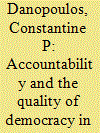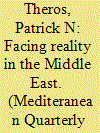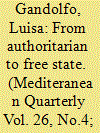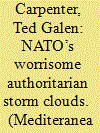|
|
|
Sort Order |
|
|
|
Items / Page
|
|
|
|
|
|
|
| Srl | Item |
| 1 |
ID:
144496


|
|
|
|
|
| Summary/Abstract |
This essay explores and assesses the connection between accountability and the quality of democracy in modern Greece along three key dimensions: vertical, horizontal, and social. Vertical involves elected officials and the three branches of government; horizontal deals with the nonelected arms of government and bureaucratic agencies; and social addresses civil society, the mass media, and nongovernmental organizations. Examination and analysis of the relevant data indicate that the state of accountability in Greece is weak in all three dimensions, and a host of structural, social, and attitudinal factors contributes to this weakness. Accountability problems undermine the quality of democracy. The essay expresses hope that reforms initiated under pressure from the European Union eventually would strengthen accountability and Greece’s quality of democracy.
|
|
|
|
|
|
|
|
|
|
|
|
|
|
|
|
| 2 |
ID:
144494


|
|
|
|
|
| Summary/Abstract |
The Arab Awakening (also known as the Arab Spring) caught the Western world, and even most experts, by surprise. A fuller understanding of how the peoples of the Middle East perceive their history and their relationship with the Western world—from their own perspective and not a Western analysis of that perspective—is a sine qua non to understanding what happened and how to begin to formulate policies and actions to deal with the new reality. The Islamic State has become the champion of disaffected Sunni Muslim youth building on those perceptions, and the West underestimates it at its peril.
|
|
|
|
|
|
|
|
|
|
|
|
|
|
|
|
| 3 |
ID:
144491


|
|
|
|
|
| Summary/Abstract |
Discourses on the Arab revolutions have, to date, focused on regime change and its implications for future democratization in the region. This essay explores the impetus behind the religiopolitical tensions in Tunisia and posits that to grasp the events unfolding since 2010 the unrest must be located within an understanding of the dynamic between the Islamists and the state under President Habib Bourguiba and, later, President Zine El Abidine Ben Ali. The essay revisits the terms revolutionary and revolution within the Tunisian context and reflects on the application of the label revolutionary, contending that the act of selective labeling bears implications for an objective understanding of the revolution and its actors. Finally, the essay evaluates how far the political tensions of the past continue to mark the present through the subsequent generation of religious movements emerging from the revolution.
|
|
|
|
|
|
|
|
|
|
|
|
|
|
|
|
| 4 |
ID:
144492


|
|
|
|
|
| Summary/Abstract |
Western leaders portray the North Atlantic Treaty Organization as a league of democratic nations as well as a security alliance. Although the organization tolerated illiberal members during the Cold War, it would be more than a little embarrassing to have an outright autocracy emerge in NATO’s ranks today. Yet worrisome manifestations of authoritarianism and intolerance have surfaced in several members. Two NATO countries, Hungary and Turkey, have engaged in repeated autocratic behavior reminiscent of Vladimir Putin’s regime in Russia. Such developments provide yet another reason why US policymakers should reconsider America’s continuing role as NATO’s leader.
|
|
|
|
|
|
|
|
|
|
|
|
|
|
|
|
| 5 |
ID:
144493


|
|
|
|
|
| Summary/Abstract |
There have been important changes in the politics of the eastern Mediterranean since the discovery of energy resources and the disintegration of Turkish-Israeli relations. Israel upgraded its relationship with Greece and Cyprus after its ties with Turkey deteriorated. Since shortly after the 2010 Mavi Marmara incident, the widening divergence in interests between Turkey and Israel have provided the geopolitical impetus for the development of a rapprochement between Greece and Israel. While political, military, and economic cooperation, in particular, between Israel and Greece have significantly developed, the relations have also blossomed over mutual concern about the energy resources in the eastern Mediterranean. This essay examines the burgeoning relationship between Israel and Greece since 2010 and considers whether this relationship constitutes an important strategic alliance in the eastern Mediterranean.
|
|
|
|
|
|
|
|
|
|
|
|
|
|
|
|
| 6 |
ID:
144495


|
|
|
|
|
| Summary/Abstract |
From January 1957 to August 1958, US policy in the Middle East was guided by the Eisenhower Doctrine. A key facet of the doctrine was the creation of a coalition of conservative Arab states to oppose the influence of Egyptian president Gamel Abdul Nasser. The region’s major conservative states, Iraq and Saudi Arabia, played prominent roles in the implementation of the Eisenhower Doctrine, yet while US policymakers were eager to mold King Saud bin Abdulaziz al-Saud into a regional leader, they were decidedly ambivalent toward the ambitions of the Hashemite regime in Iraq and skeptical of its long-term viability.
|
|
|
|
|
|
|
|
|
|
|
|
|
|
|
|
| 7 |
ID:
144490


|
|
|
|
|
| Summary/Abstract |
The southern Mediterranean rim forms part of what the former Swedish foreign minister Carl Bildt called in a recent speech in Washington, DC, the “ring of fire” around Europe. Coupled with continued sluggish growth across Europe, the ongoing Greek crisis, and the rise of populist parties in many European countries, the European neighborhood faces a long litany of challenges, and the outcomes will define and determine the future of Europe and regions beyond. The broader Mediterranean region plays an integral role in this drama. While the economic and political problems of Europe have been simmering for more than five years, the security challenges have arguably emerged more suddenly and quickly.
|
|
|
|
|
|
|
|
|
|
|
|
|
|
|
|
|
|
|
|
|